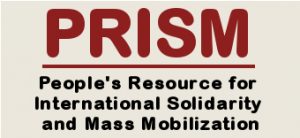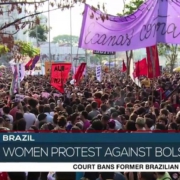On the fascist comeback in Brazil
On Bolsonaro’s foreign policy agenda; global and regional implications
Presenting himself as the “Latin American Trump,” Bolsonaro is on track to repair, renew and expand the ties with the US, which was frayed to nearly breaking point in the past decade. Right after winning the election, Trump immediately called him and the two strongly committed to “work side by side.” The White House described the US and Brazil “as regional leaders of the Americas.” Mirroring the Trump persona, Bolsonaro has quickly snuggled up to Israel (his planned first state visit), promised to withdraw from the Paris climate agreement, and remains critical of the UN system.
Brazil’s expected drastic shift to a pro-US stance is of global and regional significance. After all, it is the world’s 5th most populous country (210 million) and 7th largest economy, the 2nd largest in the Americas, and the largest in all of Latin America. It has major oil reserves, 3rd largest aircraft producer in the world (apart from a major producer of armaments), and top producer in some agricultural products. Thus, its foreign policy directions have potentially huge implications in influencing other Latin American countries.
With Bolsonaro’s foreign policy expectedly aligning with the US especially hand-in-hand with Trump, Brazil has the potential to serve as a comprehensive base for more aggressive US meddling in Latin American , e.g. vs Venezuela and Bolivia. Taken as a whole, his incoming regime represents a Latin American-wide (actually, a global, strategic, and increasingly self-conscious) resurgence of state-fascist forces.
The US is doing all it can to weaken, if not break up, the BRICS by wooing back at least Brazil and India. It appears to succeed in preventing a closer China-India alliance by fueling irritants between the two. Now, with Brazil apparently in its pocket, the US can proceed to engineer a Brazilian break-up with China (which has been Brazil’s principal trade partner and a major investor).
Persistence and aggravation of the root problems of Brazilian society
The incoming US-Bolsonaro regime is a multi-layered reminder for the peoples of Brazil and the wider Latin America that it’s not merely who is in the presidential seat or the party in power that’s the issue, or that Bolsonaro’s victory is somehow a freak accident or miscarriage of the democratic process which needs to be simply undone by parliamentary means.
Despite the reformist PT administrations of Lula and Rousseff, US imperialist interests and control in Brazil and the wider Latin America have persisted. The exploitative class structure of Brazilian society and the need for class struggle by the exploited toiling masses of workers and peasants and the middle social social strata have continued. The fascists exploited the failures and weaknesses of the social democratic PT to make their comeback.
Despite being a member of BRICS, Brazil is hobbled by continuing imperialist intrusion and meddling, greatly uneven development of capitalism in the cities, and persistent semifeudal conditions in the vast countryside. The country’s countless economic and political problems are rooted in these social contradictions.
These are the reasons why extreme poverty and yawning inequality remain most evident. These are the reasons why the working class through its political party and trade unions, and the peasantry (e.g. through Movimento dos Trabalhadores Sem Terra or MST, Landless Workers’ Movement) with its long-standing demand for land reform, comprise some of the largest social movements in Latin America today.
Even just the terrible killings (nearly 64,000 in 2017 alone) cannot be separated from the decades-long violent rural conflicts between landless peasants and landlords and the resulting displacement of peasant and indigenous communities and mass migration into congested urban slums. Especially in the northeastern region of Brazil, persistent feudal conditions aggravated by famine drove millions of impoverished peasant families to migrate either into the already teeming urban favelas, or into other rural regions such as deforested Amazon areas where they work in export-crop plantations and cattle-raising fazendas under semifeudal or extremely backward capitalist forms of exploitation.
The resultant widespread social ills, combined with government’s anti-drug and anti-criminality campaigns, then become the pretext for the fascist police to implement routine killings victimizing mainly the poor and marginalized.
The PT has not solved the roots of Brazil’s social and economic problems in their over 13 years in power. At the start of Lula’s presidency in 2003, widespread famine in north and northeast Brazil was driving waves of starving villagers into the towns, ransacking stores and markets so they could find something to eat. In that sense, it is true that social programs like Bolsa Família and PRONAF could appear to relieve the worst manifestations of poverty in the countryside and urban favelas.
However, these social programs were not accompanied by national industrialization and comprehensive land reform. They thus became open to attack and began to falter especially after the 2014 recession (during Dilma’s second government). The ruling system simply reasserted its underlying rottenness, with mass famine, starving people, widespread child labor, and other extreme forms of poverty becoming worse than ever.
These systemic factors made Dilma’s other programs, such as her anti-corruption campaign, also susceptible to a reactionary backlash that led to her being ousted via impeachment—actually a US-instigated “soft” coup d’etat. Temer, who replaced Dilma, proceeded to transition to a more pro-US, pro-oligarchic, and pro-fascist stance.
At the same time, the US-backed oligarchy intensified their anti-PT campaign, blaming the PT exclusively for the worsening corruption, economic mismanagement, and criminality. Haddad’s campaign fell into the trap and admitted PT’s role in Brazil’s worsening problems, while the deep roots of these problems—which date back to at least the 1970s at the time of the long fascist dictatorship—were not exposed.
The ILPS stands in solidarity with the people of Brazil who must now confront and fight the fascist US-Bolsonaro regime and defend national sovereignty, democracy and all the people’s rights. It is the sacred duty to themselves that the people of Brazil wage all necessary forms of revolutionary struggle against the scourge of imperialism and fascism.
They must defeat within Brazil the epidemic of fascism in order to contribute to the revolutionary struggle of the world proletariat and people to stop the spread of this malignancy. This is but a manifestation of the disintegrating world capitalist system and is the prelude to the great resurgence of the national liberation movements and the world proletarian-socialist revolution. ###





Leave a Reply
Want to join the discussion?Feel free to contribute!